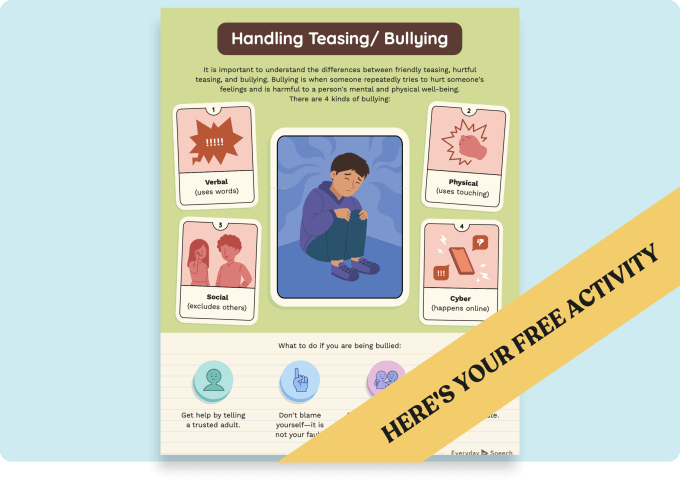Teaching Students to Stay on Topic in Conversations: A Guide for Special Education Educators
Get free social skills materials
No-prep lessons on self-regulation, emotional recognition, conversation skills, and more.
Sign up hereIntroduction
As educators, we often work with students who may struggle with staying on topic during conversations. Helping them develop this essential social skill can greatly improve their ability to connect with others and navigate social situations. This blog post will provide special education educators with a no-prep activity, discussion questions, and related skills to help students stay on topic in conversations, following the principles of Social-Emotional Learning.
No-Prep Activity
This simple activity requires no preparation or materials and can be easily implemented in the classroom. The goal of the activity is to help students practice staying on topic during a conversation.
- Divide the students into pairs.
- Ask each pair to choose a topic for their conversation. If needed, provide a list of topics for them to choose from.
- Give the students 5-10 minutes to engage in a conversation about their chosen topic. Encourage them to ask questions, make comments, and respond to their partner while staying on topic.
- After the allotted time, bring the class back together and ask for volunteers to share their conversations. Discuss how well they were able to stay on topic and any strategies they used to maintain the conversation.
Discussion Questions
After completing the no-prep activity, use these discussion questions to further explore the concept of staying on topic:
- Why is it important to stay on topic during a conversation?
- What strategies can you use to help you stay on topic when talking with others?
- How can you politely steer a conversation back on topic if it starts to wander?
- What challenges might someone face when trying to stay on topic in a conversation?
- How does staying on topic in a conversation show respect for the other person?
Related Skills
Beyond staying on topic, there are other important social skills that students in special education can benefit from developing. Some of these related skills include:
- Active listening
- Taking turns in a conversation
- Reading non-verbal cues
- Asking open-ended questions
- Expressing empathy and understanding
Next Steps
Now that you have learned about the importance of teaching students to stay on topic in conversations and have a no-prep activity to use in your classroom, it’s time to explore more resources to support social-emotional learning. Sign up for free samples of skill-based materials and activities to help your students continue developing their social skills and improve their ability to connect with others.


